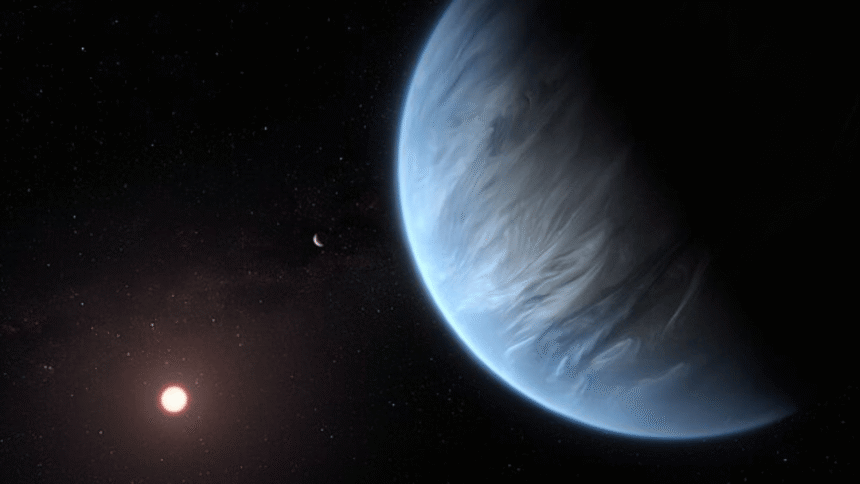From Oxford’s genetics labs to NASA’s Laboratories, 2025 has seen scientists of Indian origin reshape the entirety of modern science. 2025 witnessed remarkable explorations in medicine, artificial intelligence, climate innovation, quantum science, and even space, all spearheaded by the unprecedented imagination of Indian-born intellects.
In this piece, I trace the astounding work of overseas Indian scientists in 2025 and showcase the astonishing impact that India’s community abroad has had on advanced scientific
exploration.
1. Dr. Kavita Prakash – The Force Behind NASA’s ExoLife-1 Discovery
NASA officially announced the discovery of biosignature-like chemical traces in the atmosphere of exoplanet Gliese 486b during June 2025 which marks a significant
achievement in the extraterrestrial life investigation. Heading this mission’s atmospheric modeling team was Dr. Kavita Prakash, an Indian-origin astrobiologist raised in Bengaluru, now working at the NASA Goddard Space Flight Center.
- Her team used UV transit spectroscopy to detect potential methane and dimethyl sulfide patterns — molecules often associated with biological processes.
- In interviews, Dr. Prakash credits her IIT-Madras training in environmental modeling as the backbone of her methodology.
“We’re not just looking for aliens — we’re decoding atmospheres that could one day become human habitats,” she said at the International Astrobiology Symposium in Prague.
2. Prof. Arjun Malhotra – Pioneering AI-Powered Protein Folding at Cambridge
Prof. Arjun Malhotra from the University of Cambridge has worldwide recognition for creating FoldMind 2.0 which performs protein folding simulations 10 times better than DeepMind’s AlphaFold.
- The model developed by him makes it possible to visualize 3D protein structures instantly which plays a vital role in creating drugs to fight cancer and neurodegenerative diseases.
- Several biotech startups along with Pfizer and Novartis have begun using this groundbreaking technology to develop future-generation medications.
Prof. Malhotra, who hails from New Delhi, is leading an initiative to collaborate with CSIR laboratories of India so that South Asian universities can access open-source versions of the tool.
3. Dr. Meera Kannan – Quantum Chip Innovation in Silicon Valley
The team at Q-Logic Systems led by Dr. Meera Kannan has achieved the first commercially successful 1024-qubit quantum chip based on diamond-vacancy technology.
- The research conducted by her team removes the absolute-zero temperature requirement which makes quantum computing much more affordable.
- Indian tech companies like TCS Quantum Lab and Reliance QGrid are currently negotiating to acquire this platform for quantum-safe cybersecurity purposes.
Dr. Kannan who hails from Chennai runs an initiative to inspire Women in STEM through mentorship programs that target Indian high school girls who want to study quantum science.
4. Dr. Raghav Sharma – Climate Prediction Using AI-ML Fusion Models
Researchers across climatology now focus their attention on senior scientist Dr. Raghav Sharma at the European Centre for Medium-Range Weather Forecasts (ECMWF) because
of rising global climate changes.
- His research group issued a forecasting system during March 2025 which predicted the European April heatwave two weeks before it occurred.
- The model combines numerical weather prediction with ML-based oceanic modeling to cut error margins by 34%.
Dr. Sharma’s roots lie in Kolkata, and he holds dual affiliations with IISc Bangalore and Imperial College London.
5. Dr. Poonam Rao – Leading Breakthrough in Non-Hormonal Contraceptives
Dr. Poonam Rao at Harvard Medical School developed a new contraceptive gel which stops sperm movement while keeping ovulation intact without producing hormonal effects.
- The initial human tests reveal the gel prevents pregnancy 98% of the time and produces zero hormonal alterations.
- The FDA will likely start its fast-track approval process for the gel by the end of 2025.
Dr. Rao’s revolutionary product stands to transform reproductive healthcare access for numerous women living in both rural regions and other underserved communities
Why Indian-Origin Scientists Are Leading the Way
Factors Behind Their Rise:
- The Indian institutions IITs, IISc, AIIMS and BITS Pilani provide students with solid foundational training.
- The research networks of Indian scientists typically begin during their graduate studies in US, UK or European institutions.
- The Indian Science & Technology Consulates along with NRI research grants and Inlaks and Rhodes fellowships form a support system for diaspora researchers.
India’s Growing Role in Global Science Diplomacy
More than 1.3 million Indian-origin STEM professionals working abroad have enabled India to develop bilateral research connections through its intellectual property resources. In 2025:
- The India-U.S. Strategic Tech Alliance revealed $1.2 billion in combined research funding.
- The UK-India Science Bridge 2025 launched joint funding programs for AI and bioengineering startup companies.
A Global Legacy of Innovation
The year 2025 sees Indian-origin researchers leading groundbreaking scientific discoveries across the globe. Their Indian roots combined with global reach enable them to operate
through multiple fields and geographical and cultural boundaries which results in science becoming more inclusive and impactful and future-oriented.
India’s scientific diaspora demonstrates that national origins do not restrict the worldwide reach of scientific talent.









